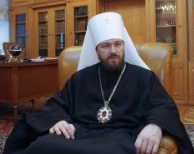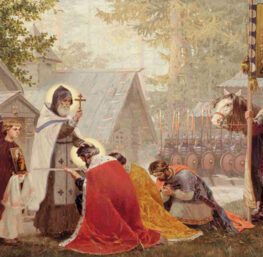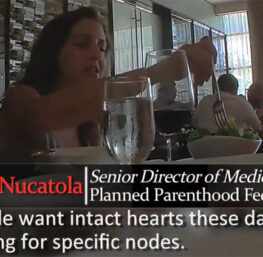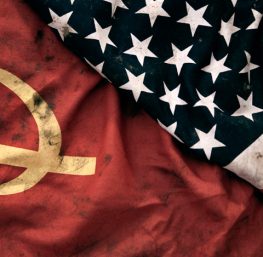AOI | by Fr. Johannes Jacobse | 3/10/2010

Metropolitan Hilarion’s warning deals with what Nietzsche called the “transvaluation of values” — what his dark prophesy warned would happen in the West because “God is Dead,” by which he meant that Western culture was entering into a period where it functioned within the cultural structures shaped by Christianity but without concrete, existential communion with the Savior — the kind of communion that would lead to martyrdom if required. Those structures would weaken as the historical memory of Christianity grew increasingly dim from one generation to the next.
That is the period we are in today, call it secularism, but understand that secularism is just a layover from one city to the next. We have left the City of God (recalling Augustine) for what — Islamic domination? Perhaps. Man cannot live by bread alone, and that includes the secularist as well as the believer.
Met. Hilarion calls for nothing less than the spiritual transformation of culture. His clarity comes from the cleansing of the persecution of the Orthodox Church by Communism, that ghastly and barbaric attempt to build a Tower of Babel on materialist principles — principles in which God, and thus any appeal to transcendent values that shape morality and meaning, were violently expunged. It unleashed a horrible evil, and that experience of suffering contributes today to the clarity of vision and great boldness we see in Met. Hilarion’s call for renewal and accountability.
Compare this to the impoverished thinking on human value coming out of Constantinople that we have been discussing on this blog the last few days. The reason Constantinople’s compromise with the dominant culture concerning abortion is dangerous is this: If the devaluation of the human person is justified by any hierarch, the moral tradition that he represents and that the West so desperately needs for cultural renewal, is presented as a perversion of itself. Abortion is always the way that social engineers begin their retooling of society. Once society accepts the devaluation of unborn life, it is much easier to devalue all other life.
Russia already went through it. We are next. Don’t believe me? Read Solzhenitsyn’s warning years ago.
(Some of you might be interested in an article I wrote several years ago that shares some of the ideas Met. Hilarion spoke about: The Artist as Vandal: Culture and the desecration of religious symbols.)

9.03.2010 · Analitics, DECR Chairman Russian Orthodox Church – Department for External Church Relations
If it does not cooperate with the Church, culture today is at risk of turning into a destructive anti-culture carrying a negative moral message, Metropolitan Hilarion of Volokolamsk, chairman of the Moscow Patriarchate’s department for external church relation, said in an interview to the RIA Novosti news agency.
Speaking about the Patriarchal Council for Culture established by the Holy Synod on March 5, he said, ‘The point is not control or censure. The point is constructive cooperation between the Church and those representatives of the world of culture who wish this cooperation. The Church does not impose anything on anybody; she only offers her participation and assistance to those who wish it’.
The Church does not have ‘an ideology’ of her own, he said, unless it is viewed as ideology that she ‘is called to save people, to make their life better, purer and brighter. And this is unachievable without having a spiritual and moral pivot’.
According to him, culture is not neutral spiritually and morally as ‘it can carry both a positive and negative moral message and can equally create and destroy’.
‘If the Church does not participate in the development of cultural life in the country, culture faces a risk of turning into an anti-culture, as was repeatedly the case in the past’, the DECR chairman warned.
In order to avoid the mistakes of the past, His Eminence Hilarion urges, ‘the wall erected between the Church and culture during the Soviet times should be removed once and for all to be replaced by a model of such relations between church and culture as to avoid putting any fetters on the development of culture but rather to create an additional potential for its comprehensive development and flourishing’.
Asked about the heated public debate about the return of valuables from museums to the Church, Metropolitan Hilarion expressed the conviction that the Church and museum workers should deal together with the problem of preserving church valuables.
‘An exchange of open letters and mutual accusations will hardly help to deal with this problem effectively. A more constructive approach would lie in direct dialogue between the Church and museum workers. This dialogue can be carried out within the framework of the Patriarchal Council for Culture’, the metropolitan stressed.
He believes that ‘a church should be a church, not a museum; the place of an icon is not in a museum, but in an acting church; the place of the Eucharistic cup or paten is on the altar, not in a glass showcase’. At the same time, he added, ‘it does not mean that old churches representing architectural monuments cannot function at the same time as museums and that icons kept in a museum church cannot be placed under security’.
As a positive example of church-museum cooperation, Metropolitan Hilarion mentioned the Icon of Our Lady of Vladimir placed in St. Nicholas’s-at-Tolmachi, which is part of the Tretyakov Gallery museum compound. This icon is under round-the-clock observation by specialists. ‘There must be much more of such examples’, the metropolitan said.
Among other areas of concern for the Patriarchal Council for Culture, not involving the problem of returning valuables, the metropolitan mentioned the restoration of church monuments of architecture and art, development of religious and secular architecture, as well as literature, poetry, painting, applied arts, cinematography and television.
As a composer, Metropolitan Hilarion believed it important that the Church should participate in the musical life of countries in the post-Soviet space. ‘We should move from one-time events, such as festivals or particular concerts, to systematic planning… The Church should promote the popularization of the musical works which carry a positive spiritual and moral message, giving special attention to Russian musical tradition and supporting young composers and performers’, he said.
Along with spiritual culture, the Council will be concerned with physical culture and cooperation with the ‘world of sports’.
‘It is quite logical to have the Council led by the Patriarch since any other level would not be appropriate today considering the scale of tasks facing the Church in her dialogue with the world of culture’, the metropolitan remarked.
The membership of the Council will be adopted by the next session of the Holy Synod. ‘Clearly, the Council will include people of creative professions as well as church workers who are linked with the world of culture in this or that way’, the Metropolitan informed the RIA Novosti.
Archimandrite Tikhon Shevkunov, father superior of the Sretensky Monastery, who is a film director by education, has been appointed as secretary of the Council.
HT: AOI Blog



